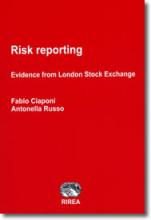
DOI: 10.17408/FC/591313
Good risk reporting is a key pillar of good governance. Risk reporting should include a detailed description of the process of risk governance in each company and how the effectiveness of this is tested. There should be meaningful consideration of the specific risks arising out of the company’s strategy and its operations, and evidence that risk management is seen as central to strategy and operations, rather than a compliance necessity. The Financial Reporting Council (FRC) and the IASB have underlined that annual report should explain how principal risks will threaten the business model, future performance, solvency or liquidity.
Companies that are successful in their risk reporting are able to link the identification, mitigation and understanding of individual risks to the strategic objectives, business model and key performance indicators to establish how the specific risks may impact business operations and performance.
This study focuses on the effects of the economic crisis in 2009 on risk disclosures using a sample of UK listed companies for a period of three years (2010, 2011 and 2012). We analyse a sample from the companies listed on FTSE 250 UK market. We choose FTSE 250 because unlike the FTSE 100, dominated by multinational companies and sensitive to swings in sterling and commodity prices, the FTSE 250 is considered to be a better reflection of the health of the UK economy.
The sample is representative of five industries: General Retailers, Food Producers, Travel and Leisure, Support Services and Construction and Materials. Each industry is analysed separately and generally, adopting quantitative and qualitative methods. The findings showed an increase in the risk disclosures practice over the three years with the effect to improve the transparency and the quality of the risk reporting.
Fabio Ciaponi is assistant professor at Università of Aquila where is course leader of Financial Statement Analysis course. He received his Ph.D. in Managerial Accounting from the University of Florence where he was researcher and adjunct professor.
Antonella Russo is Senior Lecturer in Financial Accounting at University of Greenwich where she teaches International Accounting, Financial Accounting and Corporate Governance. She got a PhD in Business Administration and Corporate Governance at Università Parthenope where she was then assistant professor. Her experiences are related mainly within the area of International Financial Reporting Standards, Auditing and Corporate Governance.


